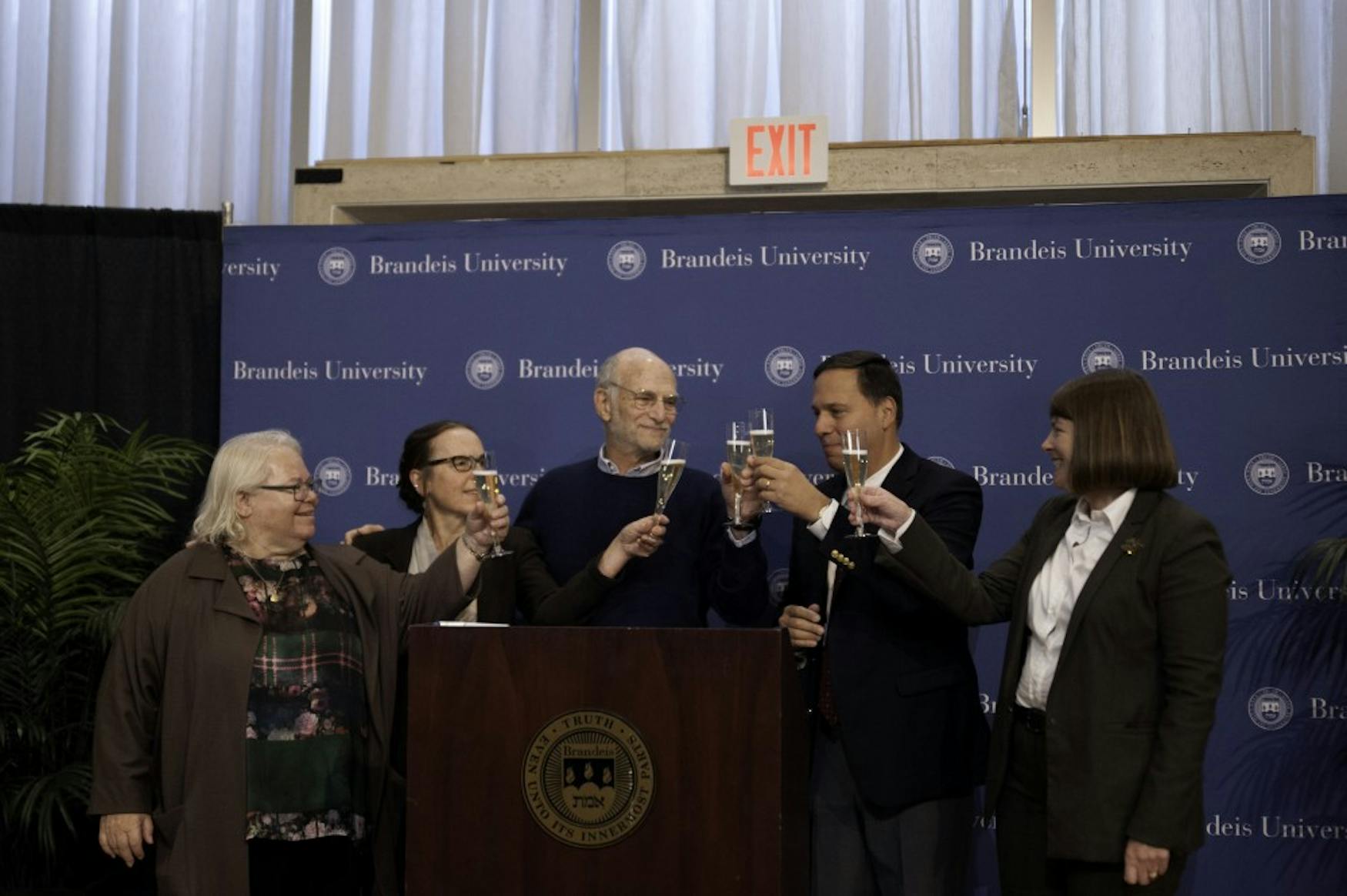Professors Rosbash and Hall receive the Nobel Prize award
“The phone call at 5:10 this morning destroyed my circadian rhythms,” Prof. Michael Rosbash (BIOL) joked of the phone call telling him he had won the 2017 Nobel Prize in Physiology or Medicine.
It was a fitting statement from Rosbash, one of three joint Nobel recipients awarded for their pioneering discoveries in circadian rhythm. The prize was awarded yesterday morning by the Nobel Assembly at Karolinska Institute.
Rosbash, the Peter Gruber Endowed Chair in Neuroscience, was lauded alongside colleague and Prof. Emeritus Jeffrey C. Hall (BIOL) for their four key publications on the circadian rhythm, published between 1984 and 1992.
The assembly also awarded Dr. Michael Young, a faculty member at Rockerfeller University in New York, for his three foundational publications on the subject between 1984 and 1998.
The three scientists successfully isolated the period gene that controls the circadian rhythm. The Nobel Assembly wrote in a press release that thanks to “the seminal discoveries by the three laureates, circadian biology has developed into a vast and highly dynamic research field, with implications for our health and wellbeing.”
The science all started with fruit flies, Rosbash explained in a phone interview with the Justice.
“We spent a long time trying to figure out how biological timing takes place and how circadian rhythms are orchestrated directly. We found these key genes that work in the fruit fly and discovered a feedback loop — a transcriptional feedback loop — which is really the center of the timing mechanism [of how] the gene controls its own expression,” he said. “It turns out that the same mechanism is in humans … these proteins really govern a large fraction of the structure of the genome.”
During a University press conference honoring Rosbash on Monday, Provost Lisa Lynch lauded Rosbash for his “willingness to think about problems in a different way, for being unconventional in [his] scientific thought to make these kinds of breakthroughs.” Lynch asserted that the awarding of this Nobel Prize “celebrate[s] scientific knowledge through its most basic proponents.”
Prof. Leslie Griffith (BIOL), a colleague and friend of both Hall and Rosbash, added, “Jeff has actually been a larger-than-life presence. His partnership with Michael made them an unbeatable team. This partnership is also a great illustration of the value of basic science.”
The press conference also gave a glimpse into the professor’s humanity and humility: As University President Ronald Liebowitz remarked during the event, “In addition to being a Nobel Laureate, Michael is the number one fan of our basketball team.”
Liebowitz added that “Michael represents the essence of what makes Brandeis special and unique — a world class curiosity, a desire to solve real-world challenges, and creating a community of scientists that brings tenured professors together with students in a highly interactive and rigorous community.”
In his own remarks to the University audience, Rosbash thanked several communities that he believes played a role in his success.
He first credited his career to the National Institutes of Health and later to the “social contract which underlies everything in this country” to advance humanity.
Rosbash also took time to thank not only his colleagues, but also the numerous Brandeis students over the years who “made this all possible.”
He added, “It’s impossible to name them all at this point.”
When the Justice asked Rosbash how the University played a role in his discovery, Rosbash replied, “A big part — the school’s been very supportive. It really nourishes its researchers. It encourages collaborations between different laboratories, it’s a real incubator, a special place.”
Echoing that sentiment, Rosbash explained during the press conference that “[Brandeis] has always been traditionally resource-poor and human capital rich. The place is small … [with] a tremendous cast of characters. … Brandeis is a remarkable jewel, which is why I’ve been here for 43 years and never moved.”
An undergraduate student asked him what advice he could offer students who wish to follow in his footsteps, and Rosbash joked, “I’m not sure my footsteps are a path I would recommend for anyone.”
He added, “Find your star — find something you love — and go for it. Whatever it is. You got to go for what you love and not look back 30 or 40 years later and say ‘I never tried.’ You have to try.”
When asked how the hallmark day had left him feeling, Rosbash told the Justice, “It’s sort of mid-way between awesome and shocking … in other words, terrific, but you know, I’m still a bit incredulous.”
At the end of his interview with the Justice, Rosbash spoke of what the award will mean to him moving forward. “I’m 73 years old, you know? I think my life won’t change very much. I think it’s very good for the field, it’s good for fruit flies, it’s good for the circadian field. It’s in some ways something that I share with the entire community — the entire community that studies biological rhythms and people who work with fruit flies. It’s a shared prize in many ways.”
As for his plans for his future at Brandeis? “I’m stunned by this news and will remain, I hope, your colleague and friend and ne’er-do-well human being for the next decade or so,” he said, concluding his remarks at the press conference.
Rosbash and Hall join a family of University faculty to have won the Nobel Prize, including Saul Bellow in Literature 1976 and John Nash in Economic Sciences 1995.
Rod MacKinnon ’78, H’05, became the first alumnus to receive the Nobel for studies in ion channels in 2003.
—Mihir Khanna contributed reporting.




Please note All comments are eligible for publication in The Justice.